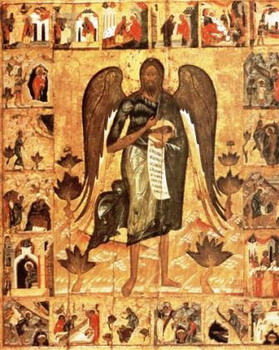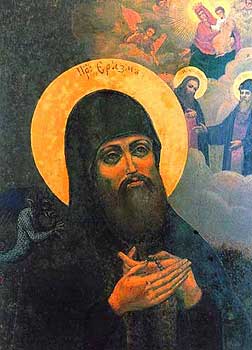|
|
The Finding of the Head of St John the Baptist The great and glorious Forerunner was beheaded at the wish and request of the wicked Herodias, wife of Herod. When John had been beheaded, Herodias ordered that his head should not be buried with his body, for she feared that the terrible prophet would somehow rise from the dead. So she took his head and buried it in some hidden and unworthy place, deep in the earth. Her lady-in-waiting was Joanna the wife of Chuza, a courtier of Herod"s. This good and God-fearing Joanna could not bear that the head of the godly man should remain in an unworthy place, so she disinterred it secretly, took it to Jerusalem and buried it on the Mount of Olives. Not knowing about all this, King Herod, when he heard about Christ and His great miracles, was afraid and said: "It is John, whom I beheaded; he is risen from the dead!" (Mk. 6:16). After a considerable time, an eminent government official came to believe in Christ, left his position in the world and became a monk. Under the name Innocent, he settled on the Mount of Olives, in precisely the place where the Baptist"s head had been buried. Deciding to build himself a cell, he dug deep and found an earthen pot containing a head which, it was revealed to him secretly, was that of the Baptist. He venerated it and re-buried it in the same place. By God"s providence, that wonder-working head went from hand to hand, disappearing into the darkness of forgetfulness and then being once more revealed, until it was finally taken to Constantinople in the middle of the 9th century, in the time of Patriarch Ignatius and the God-fearing Empress Theodora, mother of Michael and wife of Theophilus. Many miracles were performed by the head of the Forerunner. It is important and interesting to note that, while he was alive, John did not work a single miracle (Jn. 10:41), but to his relics was given the blessed power of working miracles. The great and glorious Forerunner was beheaded at the wish and request of the wicked Herodias, wife of Herod. When John had been beheaded, Herodias ordered that his head should not be buried with his body, for she feared that the terrible prophet would somehow rise from the dead. So she took his head and buried it in some hidden and unworthy place, deep in the earth. Her lady-in-waiting was Joanna the wife of Chuza, a courtier of Herod"s. This good and God-fearing Joanna could not bear that the head of the godly man should remain in an unworthy place, so she disinterred it secretly, took it to Jerusalem and buried it on the Mount of Olives. Not knowing about all this, King Herod, when he heard about Christ and His great miracles, was afraid and said: "It is John, whom I beheaded; he is risen from the dead!" (Mk. 6:16). After a considerable time, an eminent government official came to believe in Christ, left his position in the world and became a monk. Under the name Innocent, he settled on the Mount of Olives, in precisely the place where the Baptist"s head had been buried. Deciding to build himself a cell, he dug deep and found an earthen pot containing a head which, it was revealed to him secretly, was that of the Baptist. He venerated it and re-buried it in the same place. By God"s providence, that wonder-working head went from hand to hand, disappearing into the darkness of forgetfulness and then being once more revealed, until it was finally taken to Constantinople in the middle of the 9th century, in the time of Patriarch Ignatius and the God-fearing Empress Theodora, mother of Michael and wife of Theophilus. Many miracles were performed by the head of the Forerunner. It is important and interesting to note that, while he was alive, John did not work a single miracle (Jn. 10:41), but to his relics was given the blessed power of working miracles.Our Holy Father Erasmus A monk of the Caves in Kiev, he inherited great wealth from his parents and spent it all on the beautifying of churches, especially on gold and silver covers for icons. When he had impoverished himself and left himself with nothing, he was despised by everyone. The devil suggested to him that he had squandered his goods in vain in using them for the beautifying of churches instead of giving them to the poor. Erasmus surrendered to this temptation and believed it, as a result of which he came to despise himself, fell into despair and began to live aimlessly and lawlessly. When the time of his death approached, the brothers gathered round him and began to speak of his sins, for he would not consider them for himself. But he suddenly sat up in bed and said: "My fathers and brethren, you have spoken thus and so, that I am a sinner and unrepentant, but lo, St Antony and St Theodosius have appeared to me, and the most holy Mother of God, and have told me that the Lord has given me further time for repentance." The Mother of God also said these encouraging words to him: "The poor you have with you in every place, but my churches you have not." And he lived three days longer and repented and fell asleep in the Lord. This teaches us that zeal for the Church and for her beautification is a work pleasing to God. St Erasmus entered into rest in 1160. A monk of the Caves in Kiev, he inherited great wealth from his parents and spent it all on the beautifying of churches, especially on gold and silver covers for icons. When he had impoverished himself and left himself with nothing, he was despised by everyone. The devil suggested to him that he had squandered his goods in vain in using them for the beautifying of churches instead of giving them to the poor. Erasmus surrendered to this temptation and believed it, as a result of which he came to despise himself, fell into despair and began to live aimlessly and lawlessly. When the time of his death approached, the brothers gathered round him and began to speak of his sins, for he would not consider them for himself. But he suddenly sat up in bed and said: "My fathers and brethren, you have spoken thus and so, that I am a sinner and unrepentant, but lo, St Antony and St Theodosius have appeared to me, and the most holy Mother of God, and have told me that the Lord has given me further time for repentance." The Mother of God also said these encouraging words to him: "The poor you have with you in every place, but my churches you have not." And he lived three days longer and repented and fell asleep in the Lord. This teaches us that zeal for the Church and for her beautification is a work pleasing to God. St Erasmus entered into rest in 1160.Saint Cumein, Abbot of Iona
|